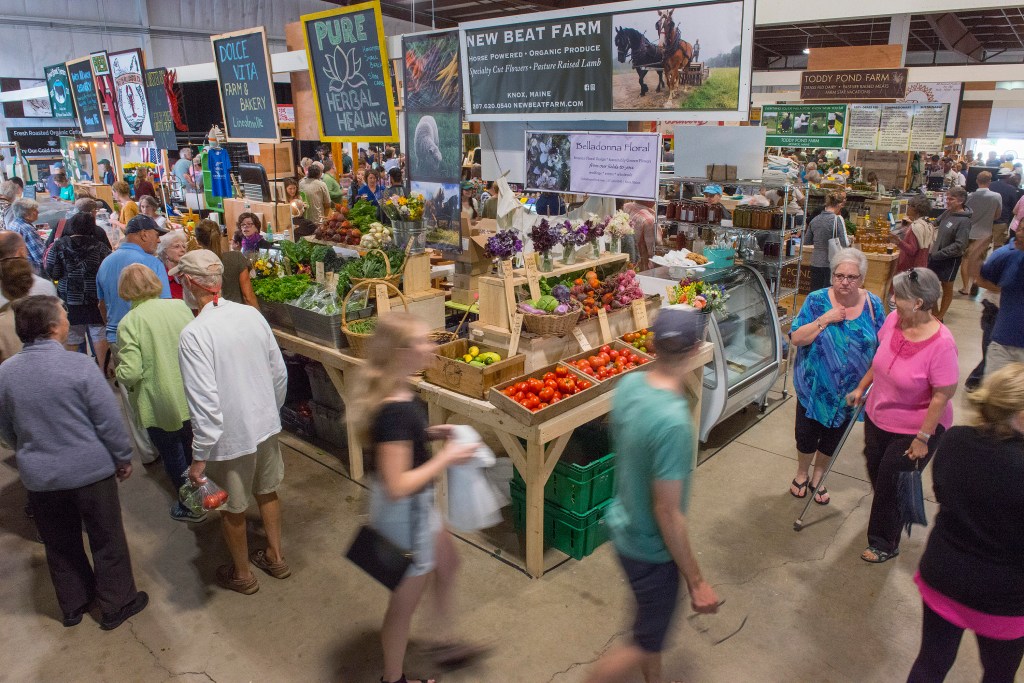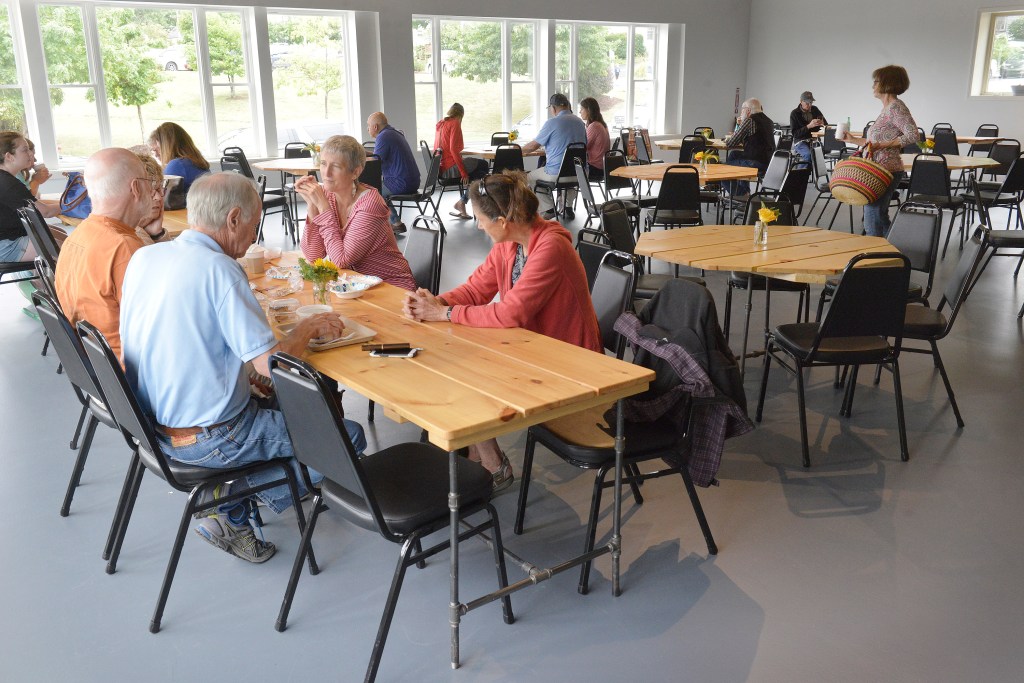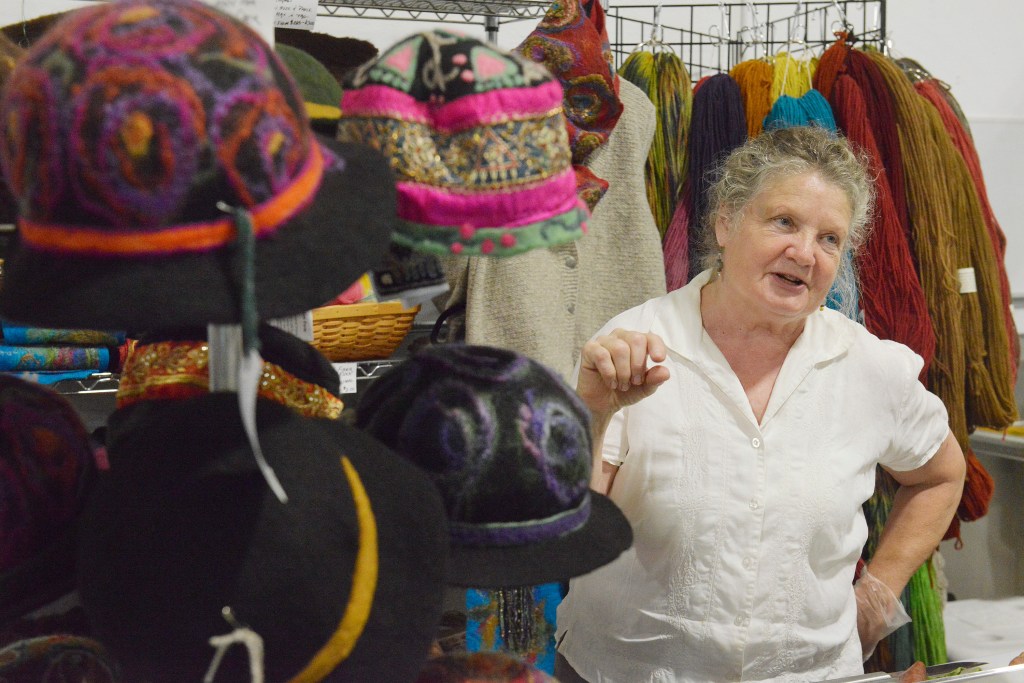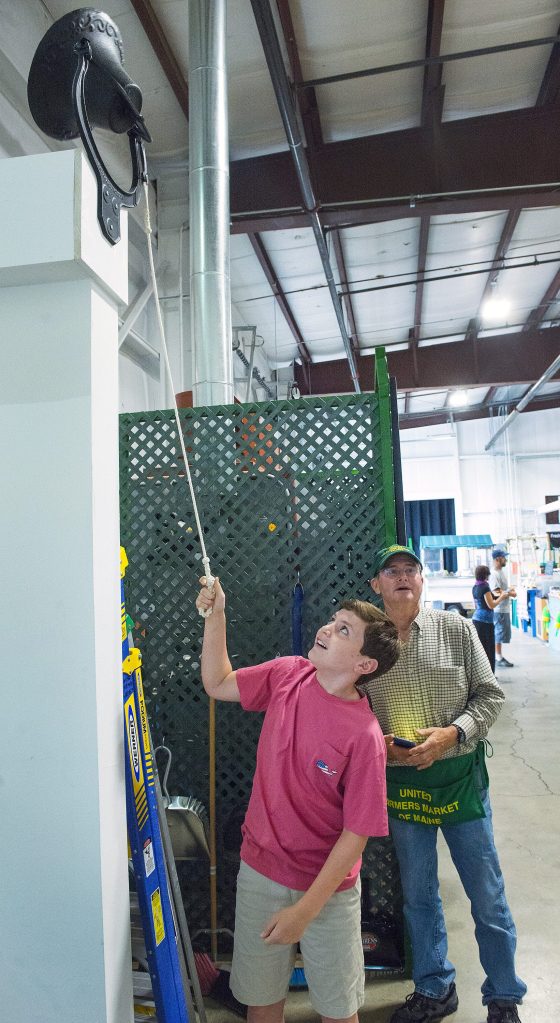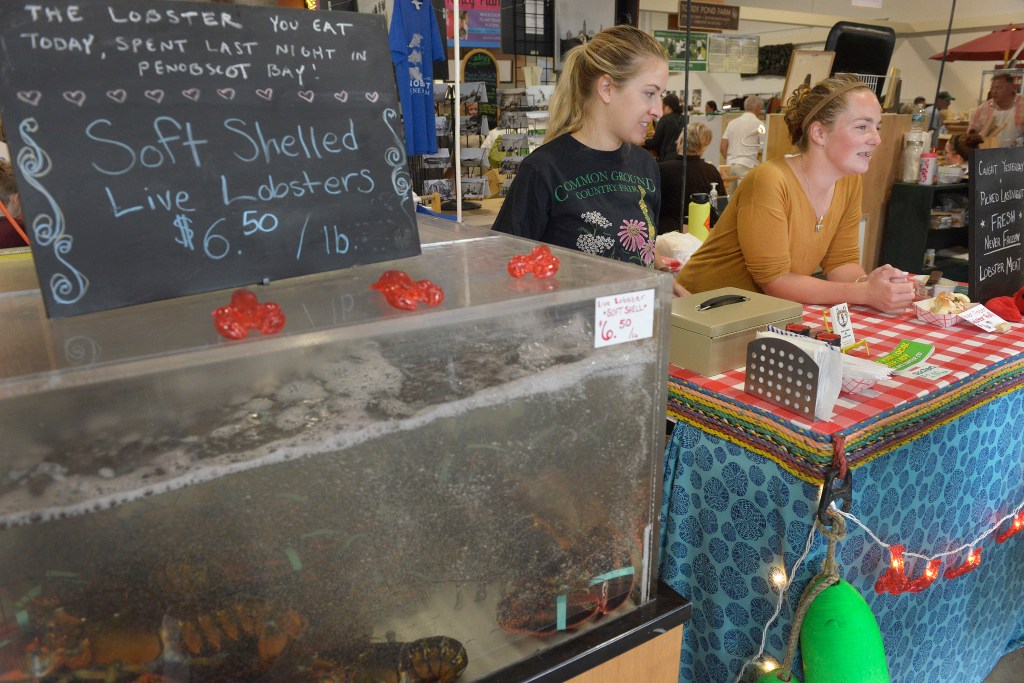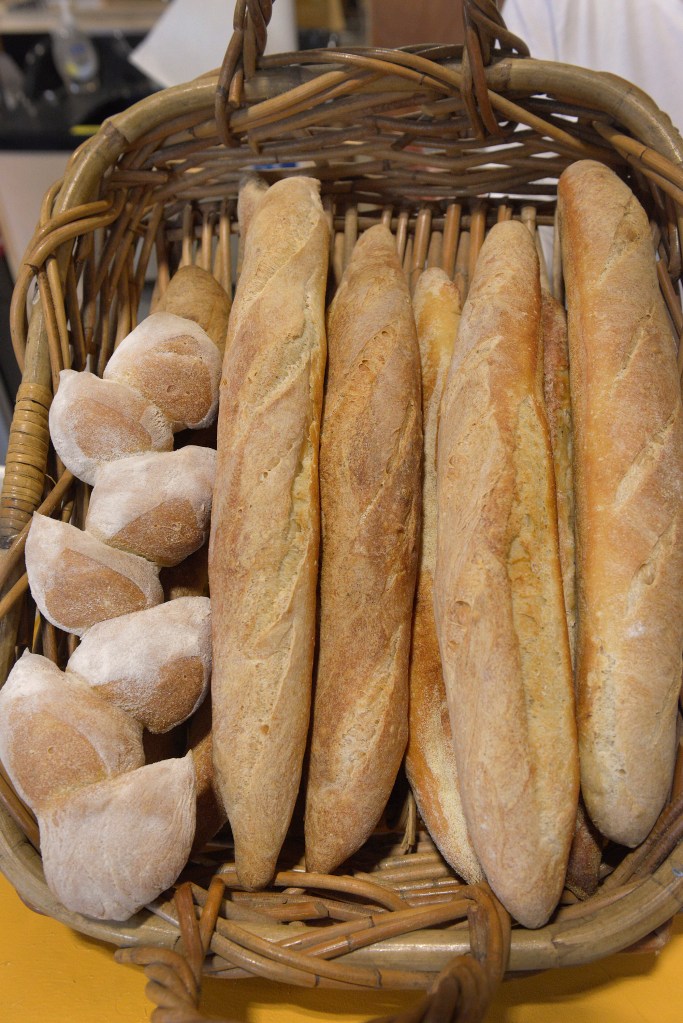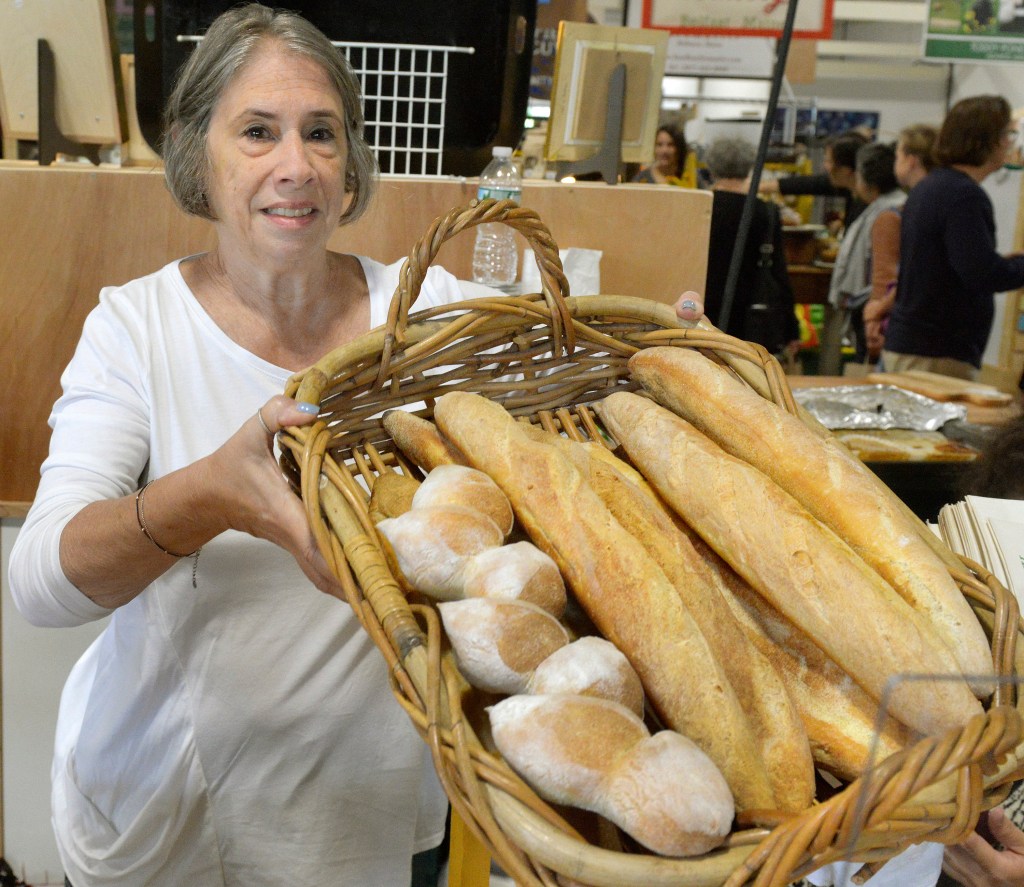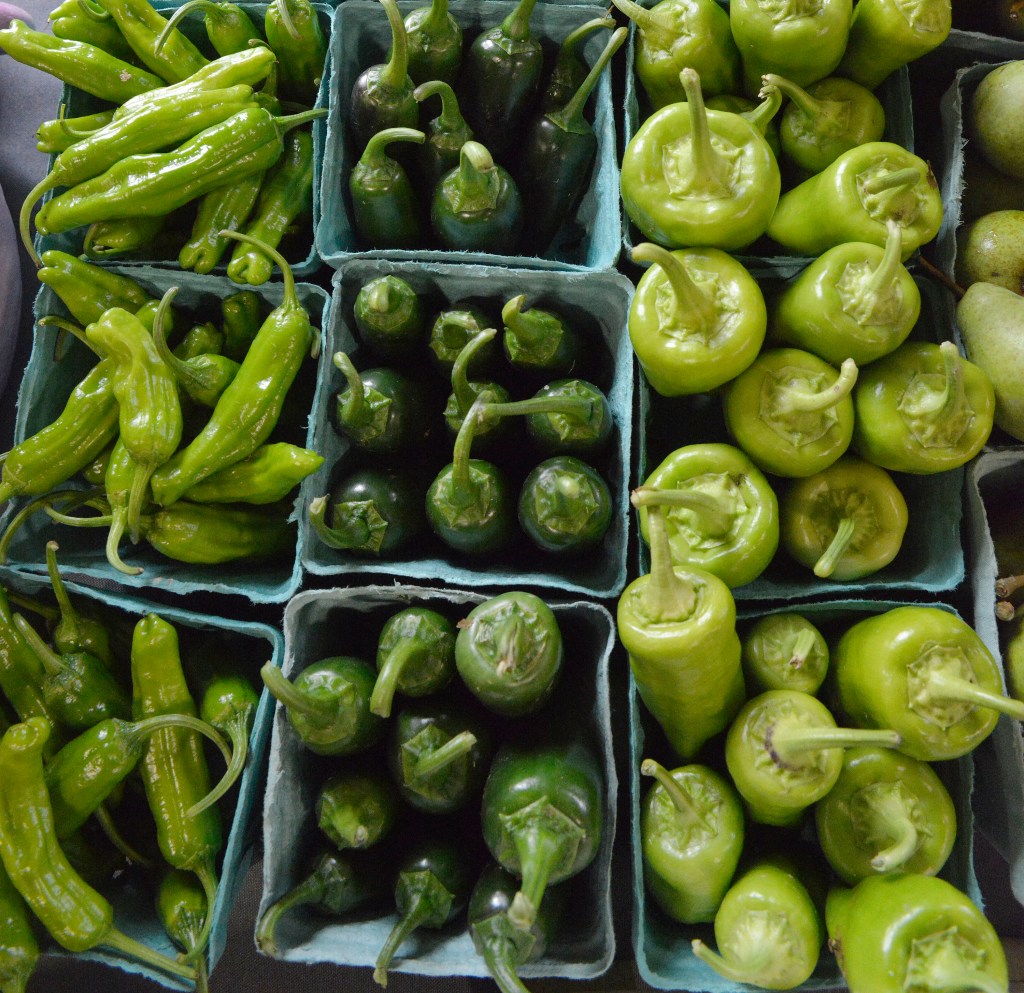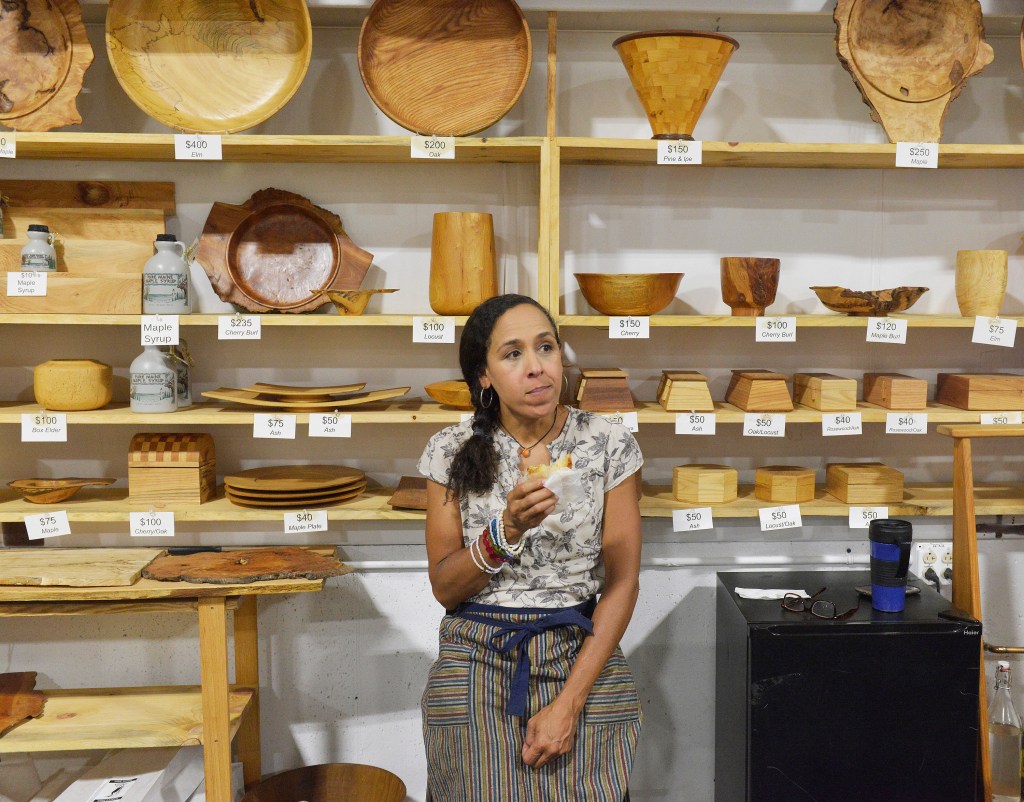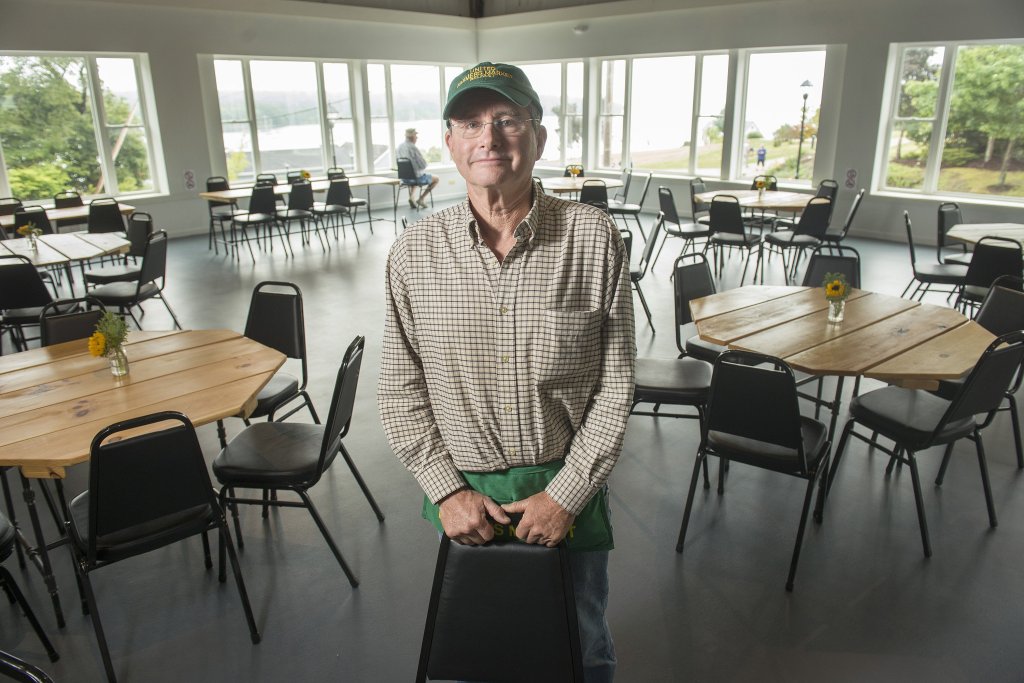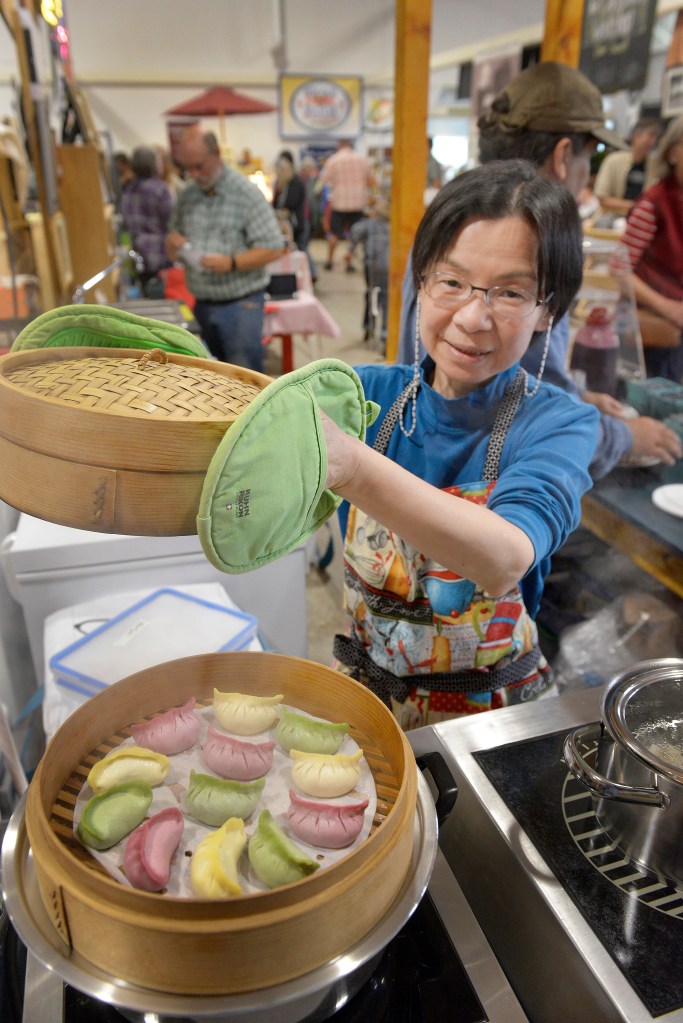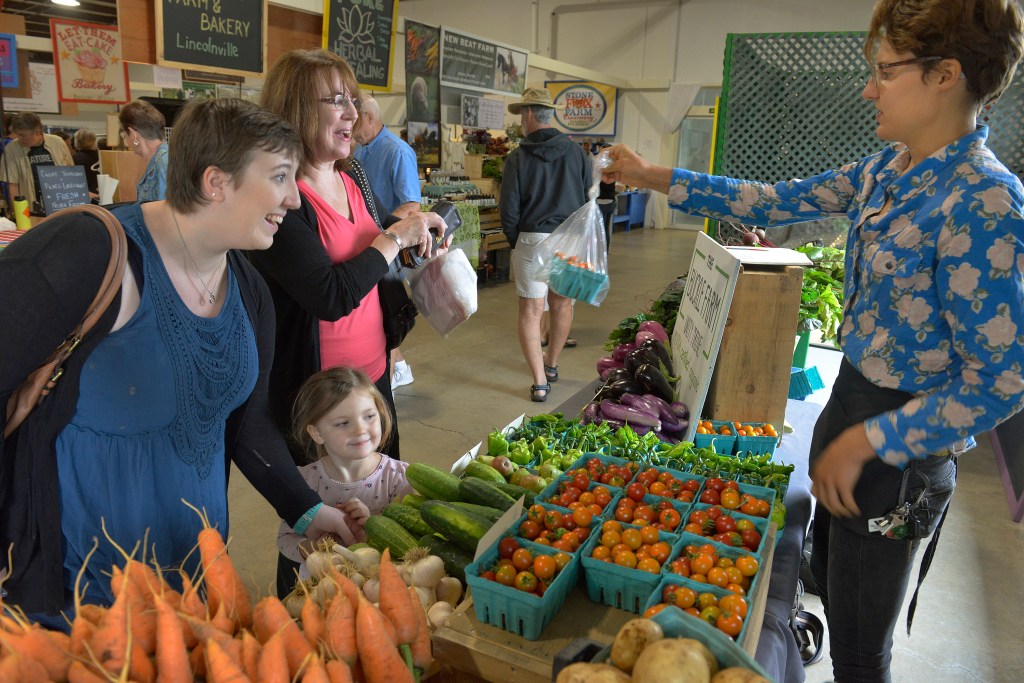Paul Naron whips out his measuring tape. Is that vendor with the popsicles infringing on unpaid territory, creeping past his or her rented 4 feet of booth space? Trailed by his assistant, Maddie Newton, he prowls the United Farmers Market of Maine like a smallish tiger in shorts, baseball cap and a hardware store apron.
He gives a running commentary of the unmanned booths as he goes; it’s midweek and the market is only open on Saturdays. This vendor with the woodsie geegaws hasn’t sold much and probably won’t be around much longer, Naron says, but that’s OK – Naron and Newton are four to five people deep in prospective vendors eager to get into what Naron says is already the best indoor market in Maine. His ambition is for it to be the best indoor farmers market in the world – never mind that Belfast has a population of fewer than 7,000 – and Naron is thrumming with the excitement of someone who senses an impossible goal might be attainable after all.
“These guys have a llama farm,” Naron says, waving the measuring tape at another booth.
“Alpaca,” Newton corrects, softly. She just graduated from Unity College in May, within days of the opening of Naron’s dream market, and has been helping him manage vendors, details and his streak of perfectionism since then.
Naron stops at Fancy Plants, a plant-based food stall. “My girlfriend is addicted to this stuff,” Naron says, rapping the measuring tape on the counter. The chalkboard sign says “Gluten free, dairy free, sugar free.” Addiction possibilities seem limited, at least to us. “Trust me,” he says.
How’s the Nitro coffee sold at the Farm House Coffee Roasters stand, the trendy stuff infused with nitrogen? “I can’t drink coffee,” he said dryly. “For obvious reasons.”
When Kate Hall of Graze Maine, a Northport microgreens producer, was considering applying to be a vendor at the United Farmers Market, she got a tour from Naron himself. His style is hands-on, even if it means driving two hours to convince a farmer to rent a booth (rates start at $31.50 a month for a 4-foot space) or being inside when he could be out sailing.
Hall was new in the business, with less than a year under her belt, although already she was selling to restaurants, including Suzuki’s Sushi Bar in Rockland and Natalie’s at Camden Harbour Inn.
“He made this comment to me, like he’d see me ‘when you get your act together,’ ” Hall remembered. She could have taken it as an insult, but instead, it felt like a challenge. “And I just looked at him. And I was like ‘Yeah, I have got my act together.’ ”
The exchange established a connection. “I really like Paul,” Hall says.
“He just wants to make sure that we are all as invested in this as he is,” she added. “I have a lot of appreciation for what he has done as a businessman and for the local farmers. Not many people would invest so much money in other people and in the community this way that he has.”
SAILING INTO TOWN
Naron, 67, is a Baltimore native who made a tidy living with a hardware chain in southeast Florida. He started with a staff of four and sold the business when it had expanded to over 100 employees. About eight years ago, he bought a house in Belfast, a place he knew from sailing and had come to like very much. The house he bought was on a corner and had a great view of Belfast Bay. To the left of it and just across the street was an old window factory belonging to Mathews Brothers, which has been manufacturing windows in Belfast since 1854. They were using the 1980s building, which isn’t much to look at from the outside, as a showroom, but the factory was elsewhere in town, out on Perkins Road.
The building was for sale, and Naron eyed it. It came with about an acre of land. It seemed suited to some sort of retail business. Those were skills he already had. He knew what a commercial property this size (30,000 square feet) would go for in booming Portland down the coast. “I was staring at this building,” he said. He made an offer. They didn’t bite. He kept staring.
One of Naron’s earliest memories is going to Lexington Market in Baltimore with his grandfather and watching fishmongers shucking oysters. As an adult, he visited indoor markets in Canada, including one in Frederictown, New Brunswick, that struck him as an indoor market done right. He is a believer in buying both lettuce at the farmers market, and a nice lunch, and then eating the lunch in a place with a view.
As Naron mulled over a growing vision of an indoor market like that, in Belfast, he reached out to townspeople and farmers and managers at the Belfast Farmers Market.
“He came to us five or six years ago,” Anne Segeese, the manager of the Belfast Farmers Market, which is on Fridays, is 37 years old and also runs year-round, moving to a greenhouse in Belfast’s Aubuchon Hardware store from November to April. “He always references one up in Canada. He even sponsored a field trip up there and took a couple of market managers,” she said.
“We all got to know each other pretty well,” Segeese added.
But by the time Naron made another offer on the Mathews Brothers building, the one that was accepted, they’d made up their minds. “In the end, we decided to decline his offer and the primary reason was that it would be his gig. He called the shots.”
Meaning, longstanding rules, typical at farmers markets, about say, the vendors also being the producers, could be put aside. The Belfast Farmers Market operates as a democracy, with committees discussing and voting on changes. They didn’t want a boss, no matter how generous.
But the new market, Segeese says, is “beautiful.”
“It is a great asset to Belfast,” she said. Not that there weren’t anxieties about competition and duplication. She’d have rather that Naron chose a different name. He changed it from the United Farmers Market of Belfast to the United Farmers Market of Maine, but the website is still belfastmarket.com. There’s been enough confusion that the Belfast Farmers Market rebranded itself in many materials as “the original market serving Belfast.”
“We needed some way to say, ‘Hey, we are still here,’ ” Segeese said. “I had a city councilor say to me, ‘I heard you guys are moving over to Mathews Brothers!’ ”
So far the markets seem to have a different customer base, Segeese said, with Naron’s market making a lot of people who can’t ditch work on Friday to shop happy.
It’s also appealing to new vendors. Kate Hall was ready to expand her customer base for Graze, but traditional farmers markets weren’t that appealing to her. “Because I didn’t have time to break down and set up.”
Ditto for Lou Harris, the farmer behind Abraham’s Cheesery.
“We never really did farmers markets,” Harris said of his Newport goat farm, which produces goat meat, milk, cheese and yogurt. The beauty of his 8-foot booth in Belfast is that the freezer and refrigerator case stay put. Convenient and “so much cleaner,” Harris said. “You are not reaching into a cooler full of dirty ice to get your product out.”
“It’s a totally different beast,” Segeese said. She hopes that Naron keeps the place thriving, long after the summer tourists are gone; no hard feelings, she said.
“It was not all fruits and rainbows, but we’re cool,” she said.
A ROOM WITH A VIEW
The very same day Naron closed on the Mathews Brothers building, he ordered windows for a 3,000-square-foot corner of it, the one that faces the bay, same view as his house basically but mostly hidden (the window factory had had some windows, but small ones). Now shoppers can sit at the tables and watch the boat traffic in Belfast Bay.
“This is really where it all started,” Naron said, resting – briefly – on one of the tables he built himself for the room, borrowing the model from the ones chef Erin French built for The Lost Kitchen in nearby Freedom. “To make this room.”
When he was driving around to farms and inviting vendors to come visit, he used the room as a lure. A room with a view, where people would not sit with their laptops or phones (in Naron’s world, a hugely disappointing social evolution) but rather, with each other.
“I wouldn’t have done it without this room, this place where people can break bread together and have this beautiful view,” he said, “because that is the soul of the place.”
The transformation from the real estate closing to the market’s opening day in late May was only about 18 months, he said. But he’s far from done. What you see at the market is only half the building’s capacity, and he’s busy mapping out a commercial kitchen and possibly an event center in those hidden spaces (the Belfast Maskers rented the space for its production of “Annie” this summer).
“There might be a world-class restaurant here at some point,” he said, mentioning chefs from top Maine restaurants who he said were interested in opening a restaurant together in Belfast. “But I’m not counting on that.”
Even on a down day in early August, the United Farmers Market of Maine was filled with activity. Workmen were delivering the equipment for a hydroponic growing station that Kate Hall will help oversee (“We want to be able to show people things growing,” Naron said). Downstairs, off the loading dock, artist David Hurley was putting the finishing touches on a 24-foot-tall lettuce leaf (his carrot was already up), and then an Amish couple showed up.
Mary and Levi Miller had taken both bus and taxi to get from Sherman to Belfast. They had an appointment to see Naron, to show him their traditional baskets. With the help of the taxi driver who had brought them on the last leg, they set up their wares in the room with the windows.
But problematically, they were looking for someone who could sell their goods for them. It would never be feasible to take public transport on a three-hour journey each direction every Saturday morning.
Naron was nonplussed. “I love the look,” he said under his breath. Mary and Levi Miller were in full Amish garb, from bonnet to breeches. Naron examined the baskets. He picked up potholders that cost just a few dollars. He pushed a woven basket that was also a lazy Susan and watched it spin. “I love lazy Susans,” he said.
When things go wrong at the market, like when the fish guy’s freezer stopped working, Hall said Naron typically steps in to buy whatever has been lost. Or in some cases, the extras “That has happened more than once.”
With the Millers looking on, their likely three-hour journey home ahead of them, and no future at the United Farmers Market of Maine ahead of them (the place is humming with technology; not exactly Amish country). Naron began to pile up potholders onto a lazy Susan, wondering aloud, would the lazy Susans work in this room? Did they go with anything?
Not really. But he sent Newton off to cut the Millers a check. He’d buy a few things anyway. “The least I can do is pay for your cab ride,” he said.
Mary Pols can be contacted at 791-6456 or at:
Twitter: MaryPols
Send questions/comments to the editors.


